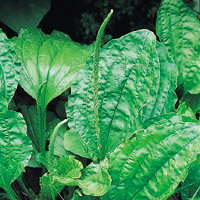Plantain
 © Martin Wall
© Martin WallParts Used & Where Grown
These green, weedy plants are native to Europe and Asia, but now grow practically anywhere in the world where there is sufficient water. Plantain should not be confused with the banana-like vegetable of the same name. The leaves of plantain are primarily used as medicine. The seeds of plantain can also be used medicinally, having mild laxative effects similar to the seeds of psyllium, a close relative of plantain.
- Reliable and relatively consistent scientific data showing a substantial health benefit.
- Contradictory, insufficient, or preliminary studies suggesting a health benefit or minimal health benefit.
- For an herb, supported by traditional use but minimal or no scientific evidence. For a supplement, little scientific support.
Our proprietary “Star-Rating” system was developed to help you easily understand the amount of scientific support behind each supplement in relation to a specific health condition. While there is no way to predict whether a vitamin, mineral, or herb will successfully treat or prevent associated health conditions, our unique ratings tell you how well these supplements are understood by the medical community, and whether studies have found them to be effective for other people.
For over a decade, our team has combed through thousands of research articles published in reputable journals. To help you make educated decisions, and to better understand controversial or confusing supplements, our medical experts have digested the science into these three easy-to-follow ratings. We hope this provides you with a helpful resource to make informed decisions towards your health and well-being.
This supplement has been used in connection with the following health conditions:
| Used for | Amount | Why |
|---|---|---|
Bronchitis | 3 cups tea daily made from 1/4 to 1/2 tsp dried herb per cup | Plantain is a soothing herb that has been shown to help people with chronic bronchitis. |
Burns | Refer to label instructions | as Plantain Topical Plantain is usually applied directly to the burn to soothe pain and help repair damaged tissue. |
Cough | Refer to label instructions | Plantain has a long history of use for relieving coughs. |
Dermatitis | Refer to label instructions | as Plantain Topical Plantain has long been considered by herbalists to be a useful remedy for cough, wounds, inflamed skin or dermatitis, and insect bites. |
Insect Bites and Stings | Refer to label instructions | as Plantain Topical Plantain has long been considered by herbalists to be a useful remedy for insect bites. Plantain is approved by the German Commission E as topical use for skin inflammations. |
Peptic Ulcer | Refer to label instructions | Because of plantain’s anti-inflammatory and healing effects, it may be beneficial in some people with peptic ulcer. |
Urinary Tract Infection | Refer to label instructions | Plantain has anti-inflammatory effects an may be beneficial in some people with UTIs. |
Wound Healing | Refer to label instructions | as Plantain Topical Topically applied plantain can be used to speed wound healing. |
Traditional Use (May Not Be Supported by Scientific Studies)
Plantain has long been considered by herbalists to be a useful remedy for cough, wounds, inflamed skin or dermatitis, and insect bites.1 Bruised or crushed leaves have been applied topically to treat insect bites and stings, eczema, and small wounds or cuts. It was considered by herbalists to be a gentle, soothing expectorant, and additionally to have a mild astringent effect said to help remedy hemorrhoids or bladder infections with mild amounts of blood in the urine.2
Copyright © 2026 TraceGains, Inc. All rights reserved.
Learn more about TraceGains, the company.
The information presented by TraceGains is for informational purposes only. It is based on scientific studies (human, animal, or in vitro), clinical experience, or traditional usage as cited in each article. The results reported may not necessarily occur in all individuals. Self-treatment is not recommended for life-threatening conditions that require medical treatment under a doctor's care. For many of the conditions discussed, treatment with prescription or over the counter medication is also available. Consult your doctor, practitioner, and/or pharmacist for any health problem and before using any supplements or before making any changes in prescribed medications. Information expires December 2026.














